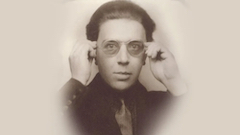
André Breton (1896 – 1966). A French writer, poet, art critic, and theorist. He is recognized as the principal founder and leader of Surrealism, an artistic and literary movement that explored the realm of dreams and the unconscious mind as a means of liberating art and thought from the constraints of reason and rationalism.
Early Life and Influences
Breton studied medicine and served as a medical auxiliary during World War I. His experiences in the war profoundly impacted him, exposing him to the horrors of reality and fueling his desire to explore alternative modes of perception. He was deeply influenced by the writings of Sigmund Freud, particularly his theories on the unconscious, dreams, and psychoanalysis.
Breton also admired the Symbolist poets and writers, such as Charles Baudelaire and Arthur Rimbaud, who explored themes of imagination and the irrational.
Dada and the Origins of Surrealism
Breton was initially involved with the Dada movement, a nihilistic and anti-art movement that emerged in Zurich during World War I. However, he grew disillusioned with Dada‘s negativity and lack of a constructive program.
In 1924, he published the Surrealist Manifesto, marking the official birth of Surrealism. The manifesto defined Surrealism as “pure psychic automatism, by which one proposes to express – verbally, by written word, or by any other means – the actual functioning of thought. Dictated by thought, in the absence of any control by reason, exempt from any aesthetic or moral concern.”